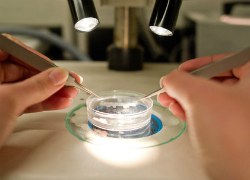Research
 The immunology research interests of our core faculty members span a wide spectrum from immune development, homeostatic regulation, cell death, response to various infections, cytokine function and regulation, and the immunogenetic control of infectious and autoimmune diseases. These projects contain both basic and translational components, given our proximity to the clinics and hospital at The University of Vermont Medical Center.
The immunology research interests of our core faculty members span a wide spectrum from immune development, homeostatic regulation, cell death, response to various infections, cytokine function and regulation, and the immunogenetic control of infectious and autoimmune diseases. These projects contain both basic and translational components, given our proximity to the clinics and hospital at The University of Vermont Medical Center.
Basic and Translational Research
- Ralph Budd, M.D.: Autoimmune mechanisms, immune cell death, Lyme arthritis, caspase regulation, immune metabolism
- Jason Botten, Ph.D..: Identification of key virus-host interactions required for viruses (e.g. arenaviruses, flaviviruses, hantaviruses) to complete their life cycle and/or cause human disease; understanding how host-driven posttranslational modifications (e.g. phosphorylation) of viral proteins regulate their functionality; understanding the natural history of host T and B cell responses to virus infection and how these immune cells contribute to protective immunity or immune-mediated pathogenesis; translating our basic science discoveries into vaccines and therapeutics.
- Emily Bruce, PhD.: Understanding how viruses (arenaviruses, hantaviruses, influenza virus) interact with host cellular machinery to facilitate virus particle assembly and release and the identification of neutralizing antibodies against these viruses.
- Karen Fortner, Ph.D.: Regulation of T lymphocyte homeostasis through cell death, metabolism, and inhibitory functions; T cell homeostasis and function in obesity and liver disease; autoimmunity.
- Mercedes Rincon, Ph.D.: T cell activation, allergy/asthma, influenza infection, T cell development, breast cancer, cancer and inflammation.
- Cory Teuscher, Ph.D..: Genetics of animal models of autoimmune and infectious disease.
- Tina Thornton, Ph.D..: Understanding the interactions of signaling pathways that control early thymocyte development and survival, the interaction of the p38 MAPK pathway and GSK3 in the context of DNA damage signaling.
Research Facilities
Biological research at UVM occurs mainly in four adjacent buildings (Given Medical Research Building, Health Sciences Research Facility, Stafford Hall, and Hills Buildings). Our division has responsibility for, or contributes to, the following facilities of the College'sCore Facilities